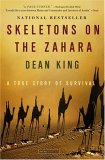Summary | Excerpt | Reading Guide | Reviews | Readalikes | Genres & Themes | Author Bio

Critics' Opinion:
Readers' Opinion:
First Published:
Jan 2004, 368 pages
Paperback:
Apr 2005, 385 pages
They did not fear much for their camels, which have their own defenses: deep-set, hirsute ears and long eyelashes that protect against flying grit, collapsible nostrils that add moisture to the searing air they breathe, and eyes with lids so thin that they can close them during a sandstorm and still see. They did not worry about them overheating either, for camels have a unique ability to absorb heat in their bodies while their brains remain insulated and stable. They conserve their body water by not sweating or panting, instead retaining the heat during the day and releasing it later. On bitterly cold nights, their owners often took refuge in their warmth. As all good cameleers knew, these prized beasts were as impervious to the abuse of the desert as it was possible to be, and they were as long-lived as they were ornery, some reaching half a century in age. Many would outlive their masters.
During the long hours of howling wind, Hamet recalled his reluctance to join Ishrel's caravan. After he had returned to Wednoon from a previous Tombuctoo caravan, which had lasted eighteen moons, his father-in-law had punished him severely for not bringing him a suitable return on the goods he had sent. The caravan, nearly as large as this one, had traveled south on a western route, near the sea, where the poor coastal tribes were too weak to attack them. They had fed, watered, and rested the camels before leaving the north. Only three hundred camels of the three thousand died of thirst and fatigue on the journey, but Hamet and Seid lost two of their four. They returned with two slaves, gold dust worth six camels, and jewelry for their wives. Hamet's father-in-law, Sheik Ali, had demanded both slaves as part of his share. When Hamet refused, Ali destroyed his home and took back his wife along with their children.
Hamet had then fled back to his tribal home near Morocco, a depressed city still feeling the devastation of the Great Plague of 1800. He had sworn off the risky life of a caravan merchant and had begun accumulating livestock. A year later, Ali returned his family to him, but Hamet stayed in the north. Then, after another two years, a friend who had been with them on the caravan persuaded the two brothers to try again. Time had washed away the memory of the cuffing sands and the sting of Ali's unjust demand and swift reprisal.
Drawn by an unnameable urge to return to the desert and counting on better luck this time, Seid and Hamet had sold their cattle and sheep, bought merchandise to trade, and joined this caravan.
And now this. For two days, sand filled their long-sleeved, hooded wool djellabas and formed piles on their backs until they shifted to ease the weight. Hamet and Seid and the rest of the traders and cameleers beseeched, "Great and merciful Allah, spare our lives!"
When the wind at last halted and the sand fell to the ground, three hundred men lay dead on the desert. Hamet and Seid, who were strong, rose and joined the rest of the survivors in prayers of thanksgiving to Allah for saving them. They spent two more days burying the dead men, always on their sides, facing east toward Mecca, and topping their graves with thorny brush to keep the jackals away. All but two hundred of the camels had been spared. As the men dug them out, the beasts rose, grunting and snapping madly, weak-kneed, snorting out the beetlelike parasites that grew in their nostrils. There were no plants for the camels to eat where they had stopped, so the men watered and fed them from the dwindling provisions.
For twenty-four more days they racked through deep, hot sand. To keep the camels from flagging under their loads, they gradually dumped tons of the salt they carried for trading. Although they encountered no more sandstorms, they found little forage for the suffering camels, whose humps grew flaccid and sagged. Before they had even reached Haherah, a celebrated watering place perhaps two-thirds of the way to Tombuctoo, they had lost three hundred more camels.
Copyright © 2004 by Dean H. King. All rights reserved.





The House on Biscayne Bay
by Chanel Cleeton
As death stalks a gothic mansion in Miami, the lives of two women intertwine as the past and present collide.

The Flower Sisters
by Michelle Collins Anderson
From the new Fannie Flagg of the Ozarks, a richly-woven story of family, forgiveness, and reinvention.

The Funeral Cryer by Wenyan Lu
Debut novelist Wenyan Lu brings us this witty yet profound story about one woman's midlife reawakening in contemporary rural China.
Your guide toexceptional books
BookBrowse seeks out and recommends the best in contemporary fiction and nonfiction—books that not only engage and entertain but also deepen our understanding of ourselves and the world around us.